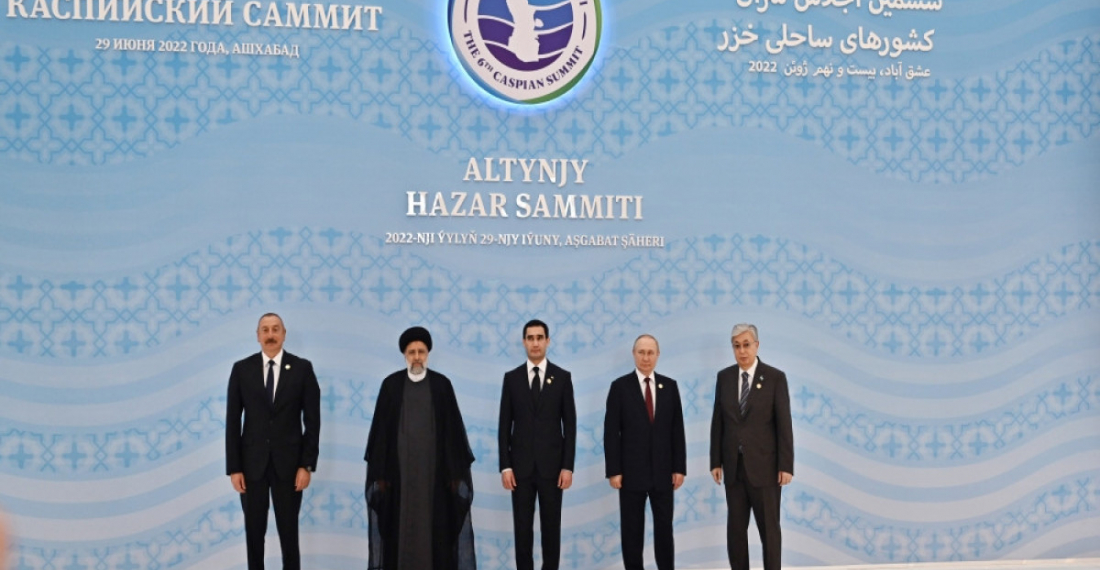|
The leaders of the five Caspian littoral states, participated in a summit meeting in the capital of Turkmenistan, Ashgabat on Wednesday (29 June). The Caspian “five” are Azerbaijan, Iran, Kazakhstan, Russia and Turkmenistan. Addressing the gathering, Russian president Vladimir Putin said: “Russia unfailingly supports expanding partnerships within the Caspian “five” – in politics, security, the economy and nature conservation, as well as many other items on the humanitarian agenda.” Putin quickly reminded his four colleagues of Russia’s first priority when it comes to the Caspian, namely the exclusion of anyone else apart from the littoral states: “At the same time, we believe that prosperity in our shared region can only be guaranteed by an unfailing commitment to the principles enshrined in the Convention on the Legal Status of the Caspian Sea. The Convention stipulates the crucial provision, which is that the countries of the Caspian “five” are responsible for the Caspian region’s preservation and its sustainable development for current and future generations.” Deputy Prime Minister, Minister of Foreign Affairs of Turkmenistan, Rashid Meredov, summarised the results of the summit at the end of the proceedings and said that the meeting was held in a constructive working manner, in the spirit of good neighbourliness, mutual trust, respect and openness. The Turkmen foreign minister said that “the heads of the Caspian littoral States reaffirmed their commitment to ensuring lasting peace, stability and security in the region, combining efforts and potentials to implement confidence-building measures in the Caspian Sea, and creating a comprehensive political and legal framework for this. The Presidents of Turkmenistan, Azerbaijan, Iran, Kazakhstan and Russia are united in ensuring that in the conditions of the current global turbulence, the region is reliably guaranteed from its consequences and impact, being an example of good neighbourliness, mutual understanding and development. “The responsibility for this lies entirely with our countries - it is common, integral, indivisible and cannot be delegated outside the Caspian states,” Meredov said. In this context, they reaffirmed their determination to continue close coordination of efforts in the fight against terrorist threats in the Caspian Sea, drug trafficking, organized crime, and other types of illegal activities. The position of the countries here is united and uncompromising. During the meeting, the issues of economic cooperation in the Caspian Sea were carefully considered. In the light of the growing geo-economic importance of the basin, there is an understanding and a desire to consistently develop cooperation in the transport, logistics, and communication spheres aimed at turning the Caspian into a major international hub of transcontinental partnership along the East-West and South-North lines. Currently, the Caspian countries are making efforts to build port infrastructure, create logistics chains of communication, schemes of mutually beneficial partnership in the energy sector. And this work will be given priority. According to the Minister, the summit stressed the need to develop and expand trade relations between the coastal states, increase trade turnover, and closer industrial cooperation. It was noted that Turkmenistan made a proposal today to establish the Council of Business Cooperation of the Caspian States as an independent platform for doing business, entrepreneurial initiatives. Ecology, nature protection, conservation of biological resources of the Caspian Sea have also become important topics of discussion. Cooperation mechanisms have already been established for them. The task is to give their work a more coherent and substantive character. The parties agreed to continue creating conditions for strengthening and enriching friendly ties, developing humanitarian contacts, and expanding cultural cooperation added Meredov. In general, the summit participants highly appreciated its content, constructive attitude, commitment to common creative goals, agreeing in the necessity and usefulness of continuing the meetings at the highest level of the Caspian countries on a regular basis. On the margins of the summit the leaders held bilateral meetings with each other. source: commonspace.eu with agenciesphoto: The leaders of the Caspian Five at their meeting in Ashgabad on 29 June 2022 |
News
Leaders of “Caspian Five” hold their sixth summit in Ashgabat






